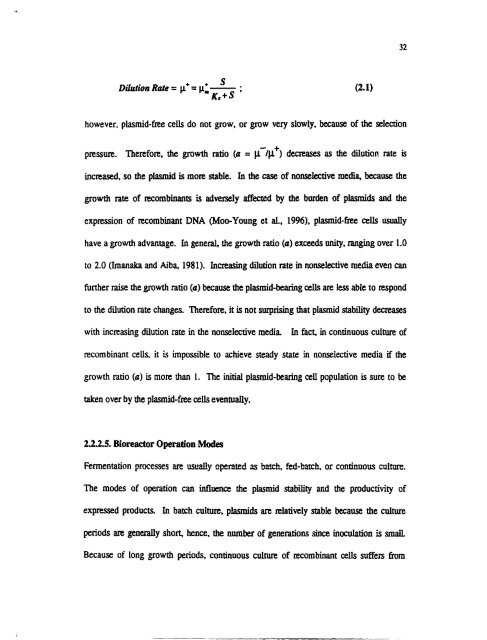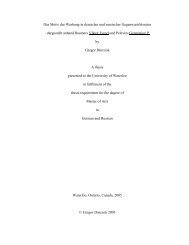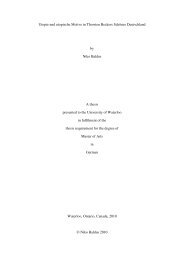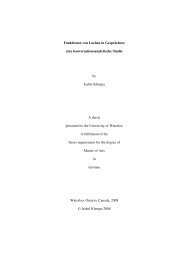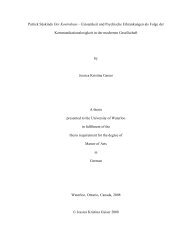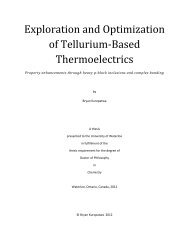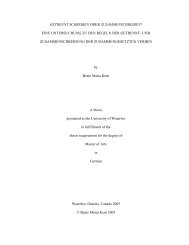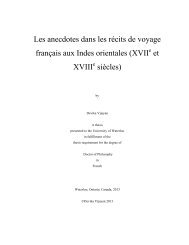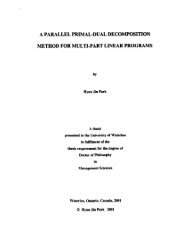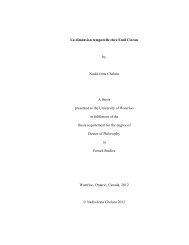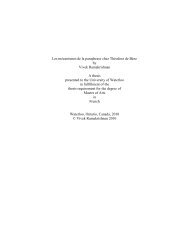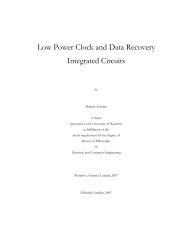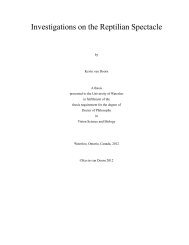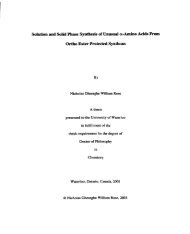- Page 1 and 2:
BIOREACTOR STUDIES OF HETEROLOGOUS
- Page 3 and 4:
nie University of Waterloo requin%
- Page 5 and 6: ate depended on activities of the p
- Page 7 and 8: Acknowiedgments Fmt of aü, 1 am ve
- Page 9 and 10: 2.6. Concluding Rernarks ..........
- Page 11 and 12: 5.3.3. Simlilated Results for Prese
- Page 13 and 14: Table 1.1. Table 1.2. Table 1.3. Ta
- Page 15 and 16: Figure 2.1. Figure 3.1. Figure 3.2.
- Page 17 and 18: during Continuous Culture in Airlif
- Page 19 and 20: Figure 5.3. Comparison between Mode
- Page 21 and 22: Cell Systern at Glucose Feed Concen
- Page 23 and 24: a .......... growth ratio (dimensio
- Page 25 and 26: Y, ... ethanol yield for fermentati
- Page 27 and 28: foreign plasmids. One major chalien
- Page 29 and 30: than the denanired, inclusion body
- Page 31 and 32: Table 1.2. Strategies for Enhancing
- Page 33 and 34: Table 1.3. Host Cek, Pfasmids, Gene
- Page 35 and 36: 1.4. Immo bilized-Cell Bioreactors
- Page 37 and 38: 1. Study the gmwth characteristics,
- Page 39 and 40: plasmid are used; or chromaromal DN
- Page 41 and 42: 2.2.1. Genetic Factors 2.2.1.1. Pid
- Page 43 and 44: 1- fkquently than a plasmid with Io
- Page 45 and 46: Da Silva and Bailey (1991) used the
- Page 47 and 48: LEU2 or TRPI is cloned into the aux
- Page 49 and 50: eported reduced stabiliity in the s
- Page 51 and 52: on metabolic pathways. In the ferme
- Page 53 and 54: OC), oniy about 35% of the populati
- Page 55: loss @) is dehned as the probabilit
- Page 59 and 60: concentration couid Iead to coexist
- Page 61 and 62: that factors other than immobiiizat
- Page 63 and 64: earing and plasmid-tke =Ils. Gel be
- Page 65 and 66: productivity irrespective of the mo
- Page 67 and 68: inactive and useless. The problern
- Page 69 and 70: Aerobic fermentation osing iamnobih
- Page 71 and 72: (ranghg h m 1 to 7) on citric acid
- Page 73 and 74: celi fraction decreases monotonicai
- Page 75 and 76: (1987) model aliows for plasmid ins
- Page 77 and 78: affect plasmid stability have ben o
- Page 79 and 80: CEtAPTER 3 MATERIALS AND METHODS 3.
- Page 81 and 82: stiU deleted hm the plasmid. Such p
- Page 83 and 84: 1) Reagent solution preparation was
- Page 85 and 86: nonse1ective agar plates, but only
- Page 87 and 88: working Liquid volume. The aeration
- Page 89 and 90: 3.5. UNnobilized Ceil Culture 35.1.
- Page 91 and 92: 3.52 Cd Lmmobiiization Yeast attach
- Page 93 and 94: 3.6. Experimental Error and Reprodu
- Page 95 and 96: -0-Cell(1) +Total CeII (2) 4- Ethan
- Page 97 and 98: * . I I a O 2 4 6 8 10 12 14 Batche
- Page 99 and 100: Cell Maso, Glucose and EthanoI(g1L)
- Page 101 and 102: 4.2.2. Batch CuIture in Stirreà-Ta
- Page 103 and 104: [t ~lucoamylase (ALR) -e Glucoamyla
- Page 105 and 106: The finai giucoamyiase concentratio
- Page 107 and 108:
Bentley and Kompala, 1989; Satyagal
- Page 109 and 110:
160 First ExponenUaI Phase 1 -c ALR
- Page 111 and 112:
Figure 4hl. Pathways of Yeast Intem
- Page 113 and 114:
fermentation (using nitrogen spargi
- Page 115 and 116:
43. Continuous Suspension Culture C
- Page 117 and 118:
Figure 4.9. Continuous Suspension C
- Page 119 and 120:
1 +Enzyme +Fradlan of PBC +CeIl Mas
- Page 121 and 122:
Figures 4.12 and 4.13 show that by
- Page 123 and 124:
Fi- 4.13. Cornparison of Glu~iase C
- Page 125 and 126:
where 6 = p- - p' + pp*, which is a
- Page 127 and 128:
Figure 4-14. Effeds of Dilution Rat
- Page 129 and 130:
Impoolsup et ai. (1989a) and Hardji
- Page 131 and 132:
Figure 4.16. dB/dt versus B Plots a
- Page 133 and 134:
Figure 4.17. Totai Cell Mas at Diff
- Page 135 and 136:
another recombinant yeast (impoolsu
- Page 137 and 138:
other recombinant yeast under nonse
- Page 139 and 140:
4.3.4. Effixt of Dilution Rate On R
- Page 141 and 142:
Figure 4.18- Etlects of Mluiioa Rat
- Page 143 and 144:
Number of Generations - - - - - - *
- Page 145 and 146:
B Table 4.5. Metabolic Pathway Anal
- Page 147 and 148:
concentration. But this may be more
- Page 149 and 150:
[+ Enzyme (ALR) + Enzyme (STR) +Fra
- Page 151 and 152:
necessary for host ce& to grow in t
- Page 153 and 154:
Glucoamylase ConcentraUon (unltsll)
- Page 155 and 156:
[a Selective Medium A Nonseiective
- Page 157 and 158:
5.1 Introduction CHAPTER 5 MODELING
- Page 159 and 160:
handle. excess glucose is femented
- Page 161 and 162:
The carbon fluxes h m the three met
- Page 163 and 164:
53. Modei Simulation in Batch CuItu
- Page 165 and 166:
Table 5.1. Summary of Parameters fo
- Page 167 and 168:
1 n Glucose o Cell Mass O Ethano1 A
- Page 169 and 170:
detennined in the cunent study, the
- Page 171 and 172:
Figure 5.4. Cornparison between Mod
- Page 173 and 174:
equations are üsted in Appendix G.
- Page 175 and 176:
a dilution rate at which the giucoa
- Page 177 and 178:
[ o Expetfmental data -Simuiated mt
- Page 179 and 180:
The effixts of dilution rate on the
- Page 181 and 182:
Ttme (hrs) 1 a Enzyme A Phsrnid-Bea
- Page 183 and 184:
It may take several generations for
- Page 185 and 186:
understanding of the nature of the
- Page 187 and 188:
On the other hand. the net accumula
- Page 189 and 190:
Differentiating Equation (6.20) res
- Page 191 and 192:
Enyme collcentration m the t>ioreac
- Page 193 and 194:
Glucoamylase Concentration (units/L
- Page 195 and 196:
50 100 150 200 Time (hrs) 1 O Free
- Page 197 and 198:
F i 6.6. Cornparison of Fnx Cd Mars
- Page 199 and 200:
. - O 50 100 150 200 250 nme (hrs)
- Page 201 and 202:
Nasi et ai.. 1988) and recombinant
- Page 203 and 204:
estimated by using Equation (6.24)
- Page 205 and 206:
[a lmmobilked System O Free System
- Page 207 and 208:
oxidation pathway. W~th increasing
- Page 209 and 210:
O 50 100 150 200 250 300 Tirne (hrs
- Page 211 and 212:
epeated batch fermentations, the fe
- Page 213 and 214:
Glucoamylase Concentration (unitslL
- Page 215 and 216:
6) Suitable for repeated-batch and
- Page 217 and 218:
ecause glucose fermentation dominat
- Page 219 and 220:
cells. Tests of the proposed model
- Page 221 and 222:
7.2. Recommendations The foUowing f
- Page 223 and 224:
APPENDIX A: PLASMID MAP FOR pGAC9 l
- Page 225 and 226:
where Bi (Biot number) = - ks De @
- Page 227 and 228:
APPENDK C. EFFECTS OF INITIAL GLUCO
- Page 229 and 230:
Figure C.2. Effect of Initial Gluco
- Page 231 and 232:
Figure C.4 Effect of Initial Glucos
- Page 233 and 234:
APPENDLX D. COMPARISON OF ORIGINAL
- Page 235 and 236:
(continue)
- Page 237:
(continue)
- Page 240 and 241:
(continue)
- Page 242 and 243:
E.2. Batch Fermentation with Recomb
- Page 244 and 245:
(continue)
- Page 246 and 247:
(continue) tfhJ 0.5 10.5 12.75 12.5
- Page 248 and 249:
(continue)
- Page 250 and 251:
E.3.2. Experimental Data (Parker an
- Page 252 and 253:
Run No: CALE (Selected Strain. D =
- Page 254 and 255:
Run No: CALR 5 (Original Suain, D =
- Page 256 and 257:
Run No: CSTR3 (Selected Suain, D =
- Page 258 and 259:
(continue)
- Page 260 and 261:
Run No: CICR2 (Selected Suain, D =
- Page 262 and 263:
Run No: CiCR4 (Selected Suain, D =
- Page 264 and 265:
Eh. Repeated Batch Culture in hmobi
- Page 266 and 267:
APPENDIX F. C CODE FOR THE PROPOSED
- Page 268 and 269:
* the initial data */ /* gening the
- Page 270 and 271:
* getting the founh term in R-K met
- Page 272 and 273:
I*Plasrnid-bearing ceU concentratio
- Page 274 and 275:
* Func tion C 1 */ îloat C l(float
- Page 276 and 277:
APPEMIM G. EXAMPLES OF MAPLE V CODE
- Page 278 and 279:
REFERENCES Ataai. MM. and Shuler. M
- Page 280 and 281:
Caunt, P.. hpoolsup, A.. and Greenf
- Page 282 and 283:
cuitanes of E. coli BZ18@TG 201) wi
- Page 284 and 285:
Gabrieisen. O.S. et aL (1990), Effi
- Page 286 and 287:
Huang, C-T., Peretti, S.W., and Bry
- Page 288 and 289:
Kim, B.G. and Shuler, M.L. (1990a),
- Page 290 and 291:
Lee, S.B.. Ryu, D.D.Y., seigel, R,
- Page 292 and 293:
Nasri, M., Sayadi. S.. Barbotin, J.
- Page 294 and 295:
Pin, S.J. and Kmwski. W.M. (1970),
- Page 296 and 297:
Seo, I-H. and Bailey. J.E. (1985).
- Page 298 and 299:
Tumer. B.G., Avgerinos G-C.? Melnic
- Page 300:
Yu, J. and Tang, X (Editor, 1991),


